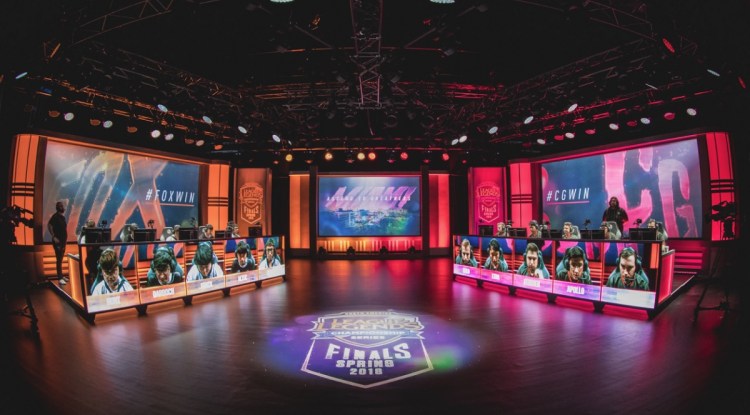The owners of League of Legends professional esports teams met in Miami recently, where they contemplated the future of esports based on the popular League of Legends franchise from Riot Games. Each team invested a reported $10 million to get a franchise slot in the North American League Championship Series (NA LCS). In return, they get better alignment of financial interests so that the teams can continue to invest for the long term in the esports league.
Team Liquid took the first-place prize in the NA LCS Spring Finals after a final match against 100 Thieves. The match took place at the Fillmore theater in Miami amid a crowd of fans and cosplayers. But the owners believe that the league and pro esports are just getting started. I spoke with a group of them recently and talked about the new franchise structure and how to make League of Legends into a lasting esport.
The interviewees included Chris “Chopper” Hopper, head of esports for Riot Games in North America; Steve Arhancet, owner of Team Liquid; Matthew “Nadeshot” Haag, owner of 100 Thieves; and Rick Fox, former NBA player and owner of Echo Fox.
Here’s an edited transcript of our interview.
June 5th: The AI Audit in NYC
Join us next week in NYC to engage with top executive leaders, delving into strategies for auditing AI models to ensure fairness, optimal performance, and ethical compliance across diverse organizations. Secure your attendance for this exclusive invite-only event.
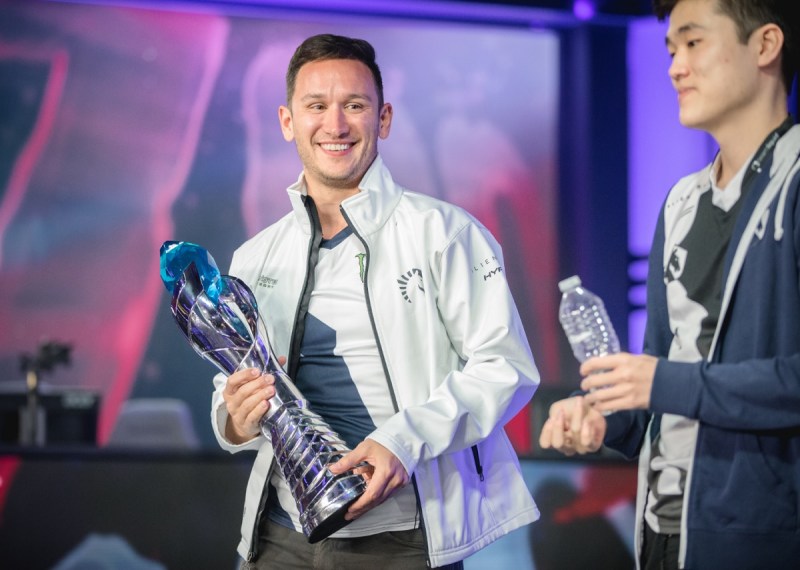
Above: Steve Arhancet (left) is the owner of Team Liquid.
GamesBeat: What’s the news today?
Chris Hopper: We’re all here down in Miami coming out of an owners’ conference, where we had all of the 10 NA LCS teams represented, talking not only about how this spring went but also taking some steps toward the future, toward this summer as well as 2019 and beyond. We just got out of that meeting, and we’re looking forward to games this weekend, with the third-place match and the championship match, between Team Liquid and 100 Thieves. We have some good League of Legends to come and some good collaboration in the meeting we just had.
GamesBeat: How do you feel about esports these days and all the excitement around it?
Steve Arhancet: Esports has exploded in terms of fandom and viewership and engagement. League of Legends has been leading the charge in terms of defining the correct league format that allows aligned financial interests from the major parties that are involved in a league — teams, players, and the league itself, in this case Riot. That franchising system has created an incubator for a level of investment of resources for Team Liquid that’s pretty exciting.
That kind of commitment and investment at those levels was never available before. We were apprehensive to spend because we could have been kicked out of the league six months later. To know that we’ll be in a permanent structure allows us to go for a larger market share of fandom in League of Legends in a much longer time horizon. That’s why we went real fuckin’ big during the off-season.

Above: The scene of the finals for the NA LCS spring finals.
GamesBeat: What are some specific changes that are helpful for what you just outlined there? What made that better?
Matthew Haag: We’re one of the new teams that ventured into the LCS, so for us, as a new organization, the fact that Riot is franchised gives us the opportunity to really invest in our organization, our players, and our content. Everything that drives revenue and drives our business. We know our participation in the LCS is always going to be there. We can spend much more time, energy, and resources on building our players’ brands and keeping players around much longer than historically has been the case in esports.
We have multi-year contracts with our players now. We’re building out our content team in more ways than have been done before with a lot of different teams, and I think a lot of the other teams are doing the same. What’s important for us is developing the story behind our brand. We know we’re here for the long haul, so we have the time to do that. We want to bring the emotion of esports and tell the stories of our players so that when they walk on stage, you have the ability to connect with them in some way compared to other teams we might match up against.
The franchising has given us long term security, which has allowed to build out our infrastructure that much better. We know that our spot is always going to be solid.
GamesBeat: There’s a lot of competition. Overwatch League is out there. What are the characteristics of a good league, a competitive one in that respect? Why invest in this league?
Rick Fox: For us, it’s the partnership, the collaboration with Riot and a collection of owners who are willing to work together for a common goal, the growth of our common interest in seeing the league expand, the game expand, the fan support grow. The celebration of esports in general is in all of our interests. We root for all esports leagues to succeed, but we focus a lot of our attention here on League of Legends succeeding and continuing to grow. It’s been a leader in the space globally for years now, and that made it easy for us at Echo Fox to focus our attention on becoming a partner. We saw a really bright future going forward with them.
GamesBeat: What do you see helping esports catch up with traditional sports in revenue per fan?
Hopper: We have a long way to go, obviously, to reach the levels of a professional sports league like the NBA. Revenue is certainly one of them. We continue to look to take the steps that make sense along that path. We want to grow the audience, deepen the fan base, make them have a greater emotional connection to the league, so they’re going to stick around and bring in their kids as fans and solidify our long-term sustainability. We want to find new revenue streams and offer compelling value-rich opportunities for fans to feel like they’re participating in the league.
The NBA has historically done a very good job of that, of being able to capitalize on stars like [Michael] Jordan and LeBron [James] and finding ways to monetize on a league front against that. We’re still in the nascent stages of that. We’ve focused primarily on putting on a league and a broadcast product that’s worthy of our fans. We feel like we’ve accomplished to a degree in the six years we’ve been running. Now, it’s about taking care of the business side.
We’re fortunate to have a great group of owners in the room, many of whom have worked with the NBA in various capacities, whether as players or owners. We’re able to look to them for guidance on some of the next steps we can take. But we don’t look at any individual sport as having a perfect blueprint for our success. Esports is always going to be a different beast from basketball or football or baseball. We need to be smart about the ways we reach out to our fan, the ways we look to monetize content, and the ways we’re presenting our different revenue streams. We think we have the right group in the room to make those decisions tactfully and lead us to success in the long term.
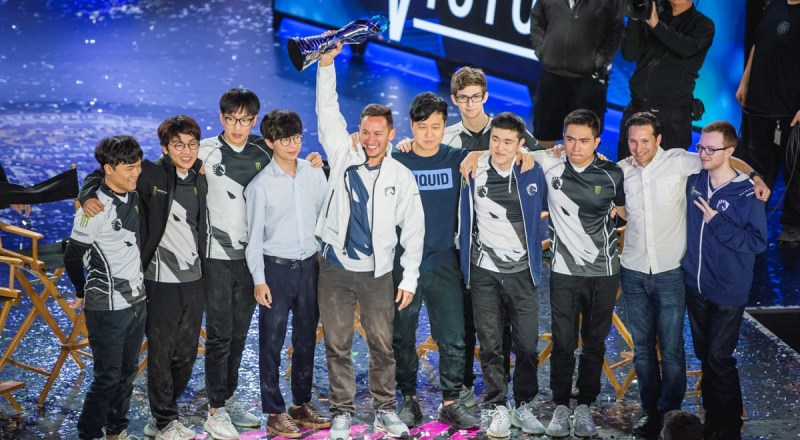
Above: Steve Arhancet holds the trophy as Team Liquid wins the spring finals for the NA LCS.
GamesBeat: I recently spoke to the folks at GenVid. They have some very interesting technology for broadcasting esports — serving individualized advertisements to particular streams, making stream watching much more interactive. It seemed like there’s a lot of potential for innovation in the ways people watch esports.
Hopper: We’re always going to look to stay abreast of current technologies. That’s one of the exciting things, as we look to the future. Basketball, with the advent of satellite TV and then the ability to watch games online, dramatically changed the way they reach out to their fans. I anticipate we will as well as technology changes, and we find new ways to bring esports to folks who are interested in watching. We’re excited about the future. We’re constantly evaluating new tech. It’s one of the reasons we’re excited about where we’re going.
GamesBeat: It seems like there are so many different parts of the ecosystem that are still taking shape. You have the amateur level, the college level, things that will feed the big leagues. How do you feel about the stage those things are at?
Arhancet: There’s the main LCS, which has the best players in North America competing for the championship title. There’s a number of what I’d consider feeder leagues that develop players and talent who will hopefully one day compete in that league. We’re pretty far along in the development of those. There’s the North American Academy League. Every franchise owner is required to field a team. Currently, we all house those athletes and develop them. Many of them will likely go from Academy to LCS here during the period between the splits. You’ll probably see some movement.
There’s a lot of opportunity to be at a local school or university, play, be noticed by one of our organizations, play for an Academy team, develop, and show your stuff. When you’re one of the best in the Academy League, you’re promoted to the LCS. There’s also a collegiate program run by Riot that allows more local activity on the college level, where they can compete for their respective schools. That’s a robust community. There’s lots of engagement. They broadcast those games. Some of those players also have made it to LCS and Academy teams.
Universities have also invested in LAN cafes, training centers, and esports facilities at their campuses. I was just at [the University of California, Irvine], and right across from the cafeteria, they have a huge facility — about 4,500 square feet if I had to guess — with tons of computers, where players can train. I know some universities are even offering scholarship programs to students. We’re pretty far along. I’m excited about seeing more young athletes enter that system and get promoted to LCS.
Haag: My background comes from Call of Duty, where Activision hosts a league of their own. Riot is so far beyond when it comes to developing talent. When I arrived in the LCS, discovering that they have this minor-league system — similar to the D-League in the NBA and minor-league baseball teams — where teams invested in the LCS are required to have an Academy team and required to be involved with honing in on new talent — for me, that was surprising. I didn’t realize that a publisher was this far along when it comes to building a robust and community-oriented group of players. For me, that was refreshing. It’s motivating for me, and as a former player, it gets me excited about what they’re trying to do for the careers of these kids.
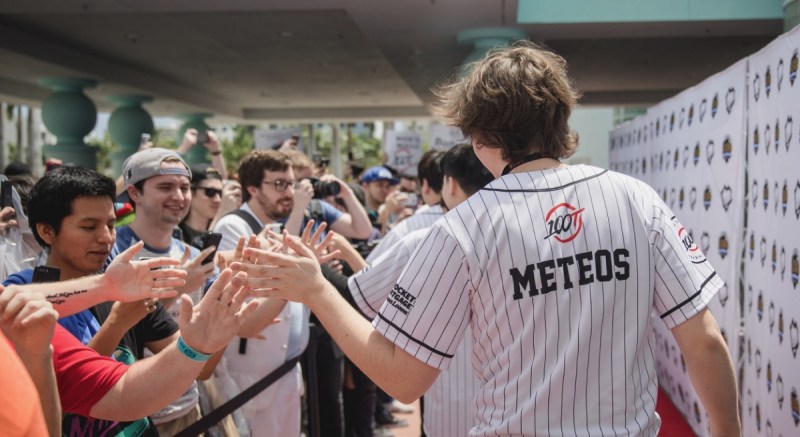
Above: Members of the 100 Thieves League of Legends esports team greet fans.
GamesBeat: Do you see a long tail for this kind of job, this emerging market of people getting paid to play games?
Hopper: Even beyond it just being a job, to the point that Steve raised, we have more than 500 students nationwide this year who are going to be on scholarship for playing League of Legends. They play for a school team and compete against other school teams. This is turning into an ecosystem where you don’t only have to go pro. We have 16-, 17-, 18-year-olds playing League of Legends, and that’s turning into real money for them in terms of scholarship options.
Looking at it in terms of [a] benefit that can be driven to the player population, it goes beyond just the pro ecosystem. There’s a lot more that we believe League of Legends can be as a general sporting ecosystem.
Haag: If we’re going to talk about long tails for professional careers in video games, one example I like to use the most — traditional sports are always going to be the same. They’re going to grow and drive more revenue in different ways, but what’s interesting to me about competitive gaming is that there will always be something new. There’s always going to be a new game, like Fortnite, that becomes a cultural phenomenon. That shows the future to me. There’s always going to be a new game that people love to play, and there’s always going to be a game where they want to prove they’re the best.
Competition goes hand in hand with video games for me, and I think Riot has led the charge on what it looks like to structure a league behind that. Players can make a living and have a long career. This is just the start. We’re in the first half of the first inning in my mind. People are taking more notice. There’s more money coming in. There’s more traditional sports franchising investing. I’m sitting next to [Rick] Fox, who I think is at the forefront in terms of buying his own team and understanding the vision and helping the esports community grow. Numbers don’t lie. The traffic is here. People need to understand that esports is not going anywhere.
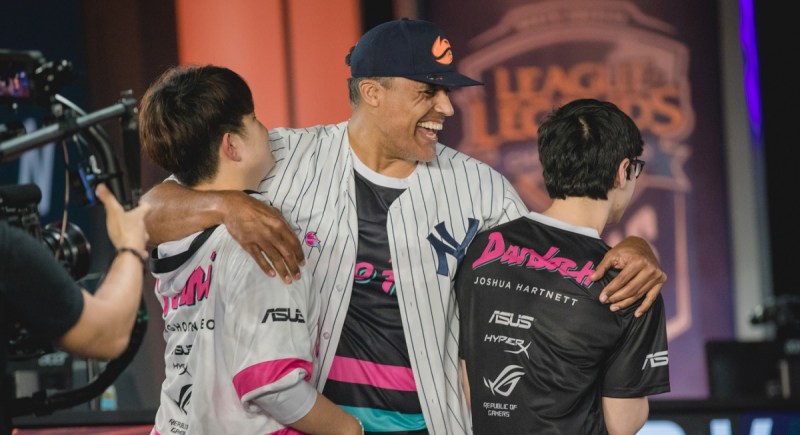
Above: Rick Fox is a former NBA player and owner of the Echo Fox esports team.
Fox: What’s going to create a longer tail than what currently exists in esports as a whole is a greater understanding of the ecosystem and what it provides a young person who aspires to make games their life. Right now, I look back on my own personal career in what people like to call traditional sports. I think sport is just sport. I don’t like the “traditional” in front of it. Competition is competition. I aspired to be an NBA basketball player. But at first, I aspired to get a scholarship to go to college.
Those things happened because I vocalized wanting that dream to be a reality. At that point, no one told me, “Put down the basketball. It has no value.” The value was I could get a scholarship and make a career for myself playing basketball. What we have today is no different in esports. Professional athletes in esports represent the same small percentage of individuals who could make it as professional athletes in the NBA, the NFL, MLB. They’re the talent with the right attitude and skill level.
But when they get there, they also represent a horde of people behind them that have the same dream to be one of them. When they fall short in the NBA or MLB or NFL, these other sporting leagues, they become coaches, analysts, agents, lawyers, sports psychologists. Within all of those fields, they can still be a part of their passion, which is that sport.
It’s no different here in esports. What you have right now is an industry filled with young people who are probably in their mid-20s, approaching their 30s, who have loved video games since the day they were born. They’ve had video games in their life and never turned away from that. They’ve made it their life’s passion as an employee.
The first person I hired in esports was 22 years old. He’s 25 now. He’s the general manager of my league team. He manages a budget of millions of dollars and a team of people his age, his peers. He’s become the backbone of one of our teams in our organization. That’s a 25-year-old man who told me on day one that he wanted esports to be his life. He’s the future of esports. I continue to hire young men and women that age who aren’t esports athletes, but they make esports go. That’s how we get the long tail.
GamesBeat: I’m hoping to cash in on it one day, too [laughter].
Fox: Cash in on it emotionally first. Everyone you’ll talk to here loves competition. We love video games. We’re getting a chance to turn it into a business, but we’re also getting a chance to [complete] a lot of dreams and passions for people who’ve spent their lives playing these games. They have a chance to have a career doing it.
GamesBeat: Maybe when we have an over-50 league.
Fox: There’s no age restrictions here, no gender, race, none of that. That’s what I love about esports. None of that is in play.
